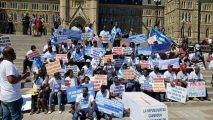2, May 2017
French PM warns of EU death if Le Pen wins presidency 0
French Prime Minister Bernard Cazeneuve has warned that the European Union will not survive if far-right leader Marine Le Pen becomes president.
“The European Union, weakened by Brexit, would not be able to withstand the new shock that would be constituted by the arrival in power in France of a government that is openly europhobic,” wrote Cazeneuve in a column in the Liberation newspaper on Tuesday.
He further called on the country to vote for front-runner Emmanuel Macron in the decisive May 7 presidential run-off.
Macron, 39, and Le Pen, 48, won the first round of voting in the presidential election on April 23. Macron finished first on 24 percent, ahead of Le Pen with 21.3 percent.





























4, May 2017
French presidential candidates hold heated debate 0
French centrist presidential candidate Emanuel Macron and his far-right rival Marine Le Pen have exchanged barbs at their only televised debate prior to the Sunday presidential runoff in France. The duel on Wednesday night was rife with verbal clashes between the two presidential hopefuls, who discussed an assortment of controversial issues on economy, national security, and foreign policy.
During the two-and-a-half hour debate, Le Pen tried to highlight her flagship policy of “France-first” nationalism, including a crackdown on illegal immigration, scrapping the euro currency, and holding a referendum on European Union (EU) membership.
Macron, for his part, called for political openness, pro-market reforms, and the slashing of public spending. At one climactic point, Le Pen branded the former economy minister as “the candidate of the elite” and a “darling of the system.” Macron called her a “liar” and a “parasite of the system” in response.
On foreign policy, the 48-year-old candidate of the far-right Front National (FN) party accused her rival of being “submissive” toward German Chancellor Angela Merkel, taking a dig by saying, “France will be led by a woman, either me or Mrs. Merkel.”
Le Pen also accused Macron of having “no plan” on national security and of adopting an “indulgent attitude” toward the terrorist threats faced by the country. The 39-year-old centrist replied that he would be “uncompromising” on terrorism, which he described as the biggest issue of the next few years in France.
Accusing his rival of “hate-filled speech,” Macron warned that Le Pen’s bellicose rhetoric would divide France and lead to “a civil war.” In a final blow, Macron reproached his rival for her policies and said, “I’m sorry, Madame Le Pen; France deserves better than you.”
In an opinion poll immediately conducted by Elabe pollsters for BFM TV after the heated debate, some 63 percent of the people interviewed found the pro-EU former economy minister more convincing versus 34 percent for the leader of the FN party.
Macron and Le Pen won the first round of voting in France’s presidential election on April 23. Macron finished first with 24 percent, ahead of Le Pen with 21.3 percent. They will now have to contend in the runoff, scheduled for May 7. Nearly 47 million voters are eligible to vote on that day. France’s outgoing President Francois Hollande urged voters last week to back Macron and reject Le Pen.
Culled from Presstv